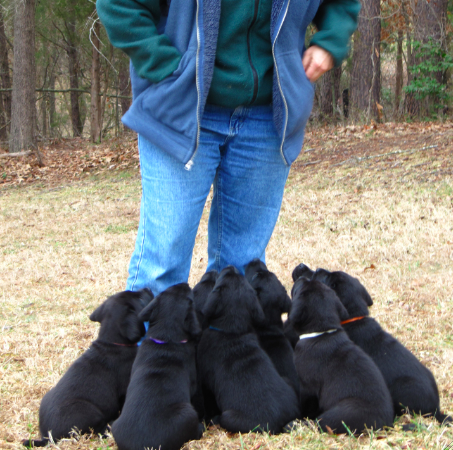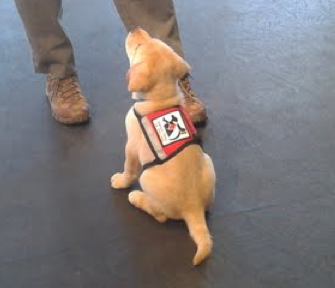
One of the breeders of assistance dogs that I was recently talking to estimates that only about 30% of dogs that enter into assistance dog training actually make it through. “Not everyone can be an astronaut”, she says.

One of the breeders of assistance dogs that I was recently talking to estimates that only about 30% of dogs that enter into assistance dog training actually make it through. “Not everyone can be an astronaut”, she says.
Assistance dogs are trained and used for many different purposes. Seeing eye dogs and mobility assist dogs are more commonly known, but there are hearing assist, and diabetes or seizure alert dogs also. There are also dogs trained to smell peanuts for children that are severely allergic. There are dogs that help veterans with PSTD, clients afflicted with bipolar disorder, children in rehab with painful burn injuries, and Alzheimer’s disease patients.
There are numerous organizations that breed and train dogs to be assistance dogs. One of the largest organizations is Canine Companions for Independence (CCI). I am currently working with Service Dogs of Virginia here in Charlottesville. Although the methods and goals of the organizations are similar, each has its own set of rules and regulations about breeding, training, puppy raising and applying for an assistance dog. And I can’t speak for other service dog organizations, but Service Dogs of Virginia is a non-profit organization and exists solely on private funding.
I spent some time helping socialize a litter of 6 puppies for a breeder of Labrador Retrievers for several assistant dog organizations. This was a fun job! I learned a lot about early puppy socialization and training and really enjoyed seeing the puppies grow and learn in the 8 weeks that the breeder had them before they went on to their puppy raisers.
Service dog breeding candidates are chosen for their even temperament and gentle disposition. Labrador Retrievers are an excellent breed for this kind of work. The puppies are whelped and raised for about 8 weeks by the breeder and then raised by special puppy-raisers until they are about a year old. They then go on to formal service dog organizations that train them further for about a year before they are transferred to a client who will keep them until they retire at about 10 years of age.
Puppy socialization and “training” can start when the puppies are as early as 4 days old. Before their eyes are even open, they are very gently handled by selected, different individuals who hold them and also place them in various positions (upside down, on their back, cradled) so they get slowly used to being handled and being able to cope with different experiences. Dr Carmen Battaglia writes about early handling and neurological stimulation exercises and studies that show that early exposure to different very light stressors will allow the dogs to better handle any future environmental condition that they come across. The dogs are also closely monitored to keep track of their response.
It is crucial at all times to make sure that the pups are exposed to different situations in a gentle and positive manner.
From the time they can walk, the pups are rewarded for good behavior. They are not picked up unless they are quiet. They are taught to wait patiently for their food and they are praised when they come when called. As soon as they can eat dry food, they are rewarded with little bits of food when they sit. By the time the pups are about 3 weeks, they are starting to sit for treats and by the time they are 6 weeks old, they can all sit for treats at the trainer’s feet, waiting patiently to be praised and rewarded.

At 8 weeks, the puppies are taken to their puppy raiser’s home where they will stay until they are about a year old. During this time, they go once a week to the service dog organization for training. The puppy raiser will also train them by taking them to supermarkets, shopping malls, and anywhere else where they can be exposed to the kind of life that they will have when they are working dogs. In the beginning, when they are young, the puppy raiser will sometimes carry them in a puppy pouch. When they get used to being in different environments or when they are in a situation that the puppy raiser thinks they can handle, they will walk by her side and wear a special service dog cape. In all cases, the puppies are exposed very gently and positively to different situations. 
If the trainer feels that the dog is having difficulty coping with situations, the dog will be re-evaluated. A good percentage of the dogs do not make it through the demanding training course required to be a service dog. The others are re-homed to either their puppy trainer or another suitable home where they are raised as pets. It is important for everyone (dog, trainer, and potential client) to be ready and able to make this decision.
I have been working with a breeder here in Charlottesville and with Service Dogs of Virginia. The breeders that give their time and energy to breed, raise and donate the puppies, the people that work for SDV and all the volunteers are to be commended. A great deal of patience, love and time goes into training these little pups and everyone puts a huge amount of effort into trying to make these dogs into the best service dogs possible.
Earlier this year, I volunteered every day for 6 weeks to raise this litter of 6 pups. I took video shots along the way and made this video of Widget’s Wonders. It’s pretty amateurish, but it still makes me smile!
If you like this post, please read other posts in the series on the Person-Centered HealthCare main page.
And if you have a story to tell that may be a fit with our series, please comment below or email me at joan@socialmediatoday.com








